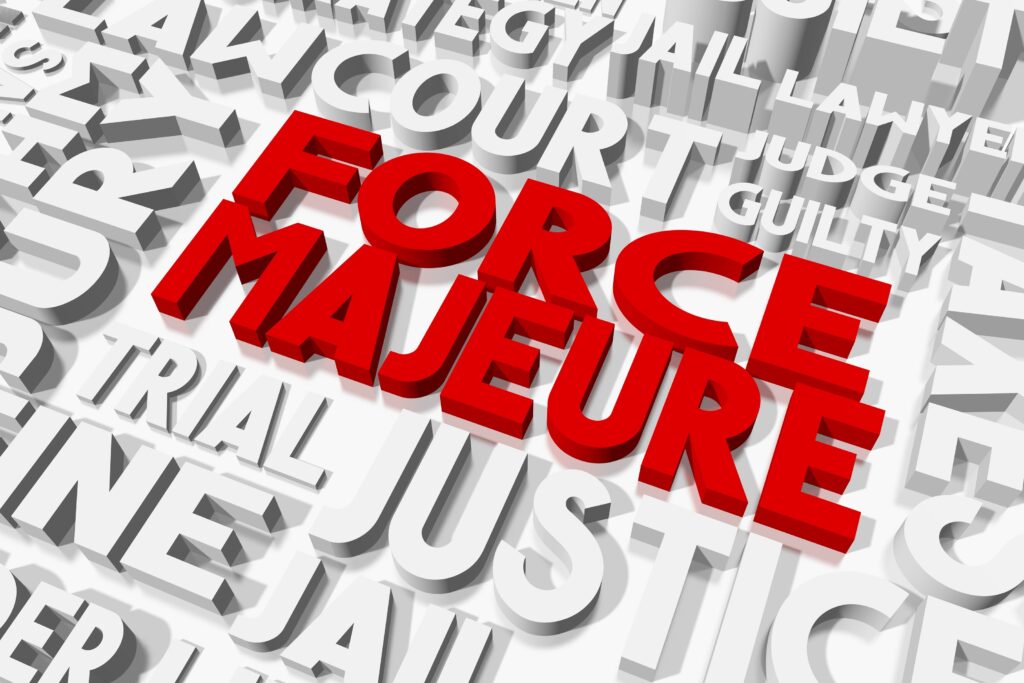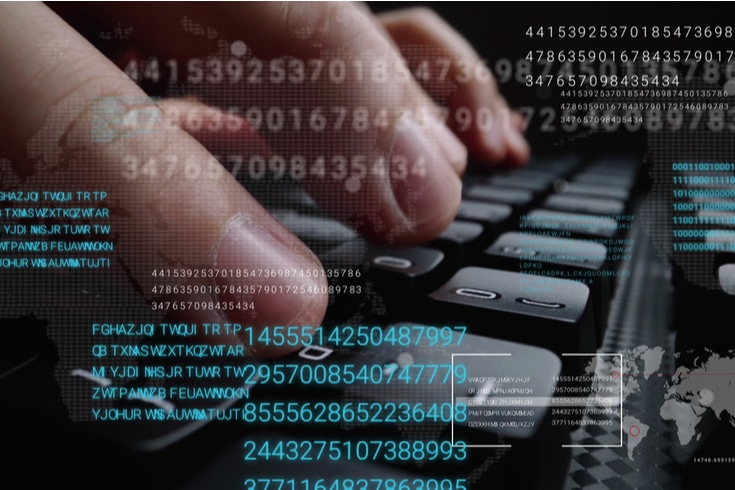What is Force Majeure and Default due to the Novel Coronavirus?

Since the start of 2020, the novel coronavirus (COVID-19) has been wreaking havoc worldwide.
With the spread of the novel coronavirus, situations may arise where, for example, a system development project manager becomes infected and must suddenly stop coming to work.
Many business owners are likely to be concerned about what to do if they face a crisis where development work is delayed and cannot meet the delivery date stipulated in the contract due to this.
There is a clause called the force majeure clause that anticipates such situations.
It is believed that this force majeure clause is often stipulated in system development outsourcing contracts, but whether it is actually applied to the novel coronavirus must be judged individually. Therefore, we will delve into whether the force majeure clause may be applied if the obligation under the contract cannot be fulfilled due to the novel coronavirus infection, and what the force majeure clause is in the first place.
For general legal responsibilities due to delays in system development contracts, please refer to the detailed explanation in the following article.
https://monolith.law/corporate/performance-delay-in-system-development[ja]
What is a Force Majeure Clause?

What is Force Majeure?
Force majeure refers to external events that are beyond the control of the contract parties. Typical examples include natural disasters such as typhoons, earthquakes, floods, tsunamis, and social phenomena such as wars, riots, and terrorism. In addition, the outbreak of diseases like the recent spread of the novel coronavirus is often included in force majeure. Under Japanese law (Japanese Civil Code), if a party fails to fulfill its contractual obligations on time, it can be held liable for damages. However, if the failure to fulfill the obligation is not due to the party’s fault, it will be exempted. The occurrence of force majeure, as stipulated in the force majeure clause, is exactly such a case.
Example of a Force Majeure Clause
There are various ways to define a force majeure clause, but typically it looks like the following:
Article ○ (Force Majeure)
If one party to this contract is delayed or unable to perform its obligations under this contract or individual contracts due to the circumstances specified in the following items, it shall not be held responsible.
(1) Natural disasters, fires, and explosions
(2) Infectious diseases
(3) Wars and civil unrest
(4) Revolutions and national divisions
(5) Orders and dispositions by public authorities
(6) Riots
(7) Other situations similar to the preceding items
When stipulating a force majeure clause in a contract, it is common to list specific reasons that constitute force majeure, as in the example above, and to include a catch-all clause (comprehensive clause) like item (7) to capture reasons not listed. If a catch-all clause is provided, the specifically listed reasons are interpreted as illustrative and not limiting, allowing for flexible solutions in the event of unforeseen circumstances.
Considerations for the Application of Force Majeure Clauses

Whether a force majeure clause applies when a contract is breached due to the COVID-19 pandemic is determined on a case-by-case basis. For a force majeure clause to apply, it is generally necessary to satisfy the following two conditions:
- The event qualifies as “force majeure”
- There is a causal relationship between the force majeure and the breach of obligation
Qualification as Force Majeure
If “epidemic” or “infectious disease” is specified as a cause in the force majeure clause, you might think that the spread of the new virus naturally falls under “epidemic” or “infectious disease”, and the force majeure clause should naturally apply. However, it should be noted that just because a new virus has become prevalent, it does not necessarily fall under the “disease” or “infectious disease” specified in the force majeure clause. As explained at the beginning, force majeure must be an event beyond the control of the contracting parties. Otherwise, it cannot justify the exemption from contractual obligations. Therefore, for the spread of the new virus to qualify as a force majeure event, situations beyond the control of the contracting parties, such as the complete closure of factories or offices essential for contract performance due to the spread of infection, serious accidents in communication lines preventing work from proceeding as planned, or the inability to obtain necessary supplies for contract performance due to logistics disruptions, must occur.
On the other hand, if there are alternative measures, such as being able to obtain necessary supplies at inflated prices due to the spread of the new virus, or being able to continue work at home through telework even if the workplace used for system development is closed, it is likely not to be recognized as force majeure because it can be controlled by the efforts of the contracting parties. In the case of the spread of the new coronavirus, if there are restrictions on logistics due to the issuance of a state of emergency or other measures by the state, resulting in delivery delays, or if work necessary for contract performance becomes impossible due to a sudden ban on going out, it is often judged to be force majeure because it is difficult to control by the judgment or efforts of the contracting parties.
Causal Relationship between Force Majeure and Breach of Performance
In order for contractual obligations to be exempted on the grounds of force majeure, there must be a causal relationship between the force majeure and the breach of obligation. For example, if a delay in system development occurs during the spread of the new coronavirus, but the cause is a mistake by the development person in charge, exemption is naturally not recognized. This is because it would be unbalanced if something that would not normally be exempted is exempted as a result of the coincidental occurrence of a force majeure event.
Court Cases on Force Majeure

There are several court cases that have been disputed over whether they fall under force majeure, such as the following:
Collapse of the Bubble Economy
In a lawsuit disputing whether the economic conditions after the collapse of the bubble economy fell under the requirement for extending the deposit holding period for golf membership rights, which is “in case of natural disasters, significant economic changes, or other unavoidable circumstances in the operation of the company and the club”, the court ruled that it did not constitute a “significant economic change”.
“Significant economic changes” are understood to be those where extremely high levels of change equivalent to natural disasters are expected. However, although the economic conditions after the collapse of the bubble economy were unprecedented, they were not unpredictable to the extent that they could be considered to meet the requirement.
Tokyo District Court, April 27, 2005 (Heisei 17)
Flood Damage Caused by Heavy Rain
On the other hand, in a lawsuit disputing whether the defendant, a repair shop, was liable for damages due to non-performance of the obligation to deliver a car that had been completely destroyed due to flood damage caused by the Tokai heavy rain, the court ruled that the repair shop was not liable for non-performance of the obligation. The court specifically found that the repair shop had no foreseeability of the occurrence of heavy rain and the resulting flood damage, and also had no possibility of avoiding the damage.
The defendant could not have foreseen the occurrence of a non-typhoon heavy rain that brought unprecedented and large amounts of rainfall, like the Tokai heavy rain, and it should be said that the defendant could not have established a crisis management system to deal with floods caused by such heavy rain. Also, considering that the Tokai heavy rain did not uniformly hit the suburbs of Nagoya, and moreover, unlike a typhoon, it started to rain slowly and the total rainfall was enormous, it cannot be said that the defendant had the possibility of grasping the progress of the rainfall early and foreseeing the flood damage or the submersion of the car in question. … It should be said that the defendant had no possibility of avoiding the submersion and total loss of the car in question.
Nagoya District Court, January 22, 2003 (Heisei 15)
The Court’s View on Force Majeure
From these two court cases, it can be said that when a breach of obligation occurs, the court judges whether it is reasonable to hold the contracting party responsible from the perspective of whether there was a possibility of foreseeing the occurrence of the damage and whether there was a possibility of avoiding the damage, rather than the interpretation of the force majeure clause itself. Therefore, even if the force majeure clause is not clearly defined in the contract, as in the second case of the Nagoya District Court on January 22, 2003 (Heisei 15), the court may recognize exemption if it can be said that there is no reason to attribute the non-performance of the obligation to the party. It should be noted, however, that this does not mean that there is no point in stipulating a force majeure clause in the contract. If the force majeure clause is clearly defined in the contract, it will be easier to reach an agreement to exempt by negotiation between the parties without resorting to litigation, so there is a certain significance in providing a force majeure clause.
Points to Consider When Establishing a Force Majeure Clause

While situations like the recent spread of the novel coronavirus do not occur frequently, they can have a significant impact on contractual relationships when they do occur. Therefore, it is necessary to include a force majeure clause in at least the important ongoing contracts. As for the force majeure clause, it is common to list as many specific reasons as possible, as in the examples mentioned above, and finally to provide a catch-all clause such as “other situations equivalent to the preceding items”. The term “force majeure” is abstract, and when an event that is considered to be a force majeure occurs, it is often disputed between the parties whether it qualifies as a force majeure.
Therefore, it is desirable to list as many specific reasons as possible in the force majeure clause to ensure predictability for the parties. For example, if you are the ordering party in a system development contract, you would want to limit the scope of force majeure. The obligation that the ordering party bears under the contract is the obligation to pay remuneration, and it is stipulated in the Civil Code that the obligation to pay money cannot be exempted even by force majeure.
Therefore, it can be said that the main beneficiaries of the force majeure clause in a system development contract are the contractors. For this reason, as the ordering party, you need to consider limiting the scope of the specific enumerated reasons in the force majeure clause. For example, for “earthquakes”, which are often listed as enumerated reasons, there is hardly any need for exemption if the earthquake is of a magnitude 2-3. Therefore, specifying “major earthquakes” or “earthquakes of magnitude 6 or higher” is one method.
On the other hand, if you are the contractor in a system development contract, you need to list as many possible events as possible as enumerated reasons in the force majeure clause. For example, if a network environment is essential for system development, it may be a good idea to include “communication line accidents” in the enumerated reasons. For more details on the checkpoints in a contract for system development, please refer to the following article.
https://monolith.law/corporate/checkpoints-for-contracts-of-system-development[ja]
Summary
The recent outbreak of the novel coronavirus has spread worldwide, with measures restricting economic activities such as stay-at-home orders being implemented in various cities. If a state of emergency is declared or a city lockdown is enforced, it is highly likely that this could be considered a force majeure event, potentially exempting parties from liability.
However, if it is anticipated that a breach of contract will occur due to an event that could be considered force majeure, it is advisable to first discuss with the other contracting party and decide on measures such as extending the deadline. Therefore, if it is expected that the deadline will not be met, it is important to consult with the other party to the contract as early as possible. Whether there is room for exemption from liability due to force majeure varies depending on the circumstances that caused the delay, so if negotiations with the other party do not seem to be going well, we recommend consulting with a legal professional.
Guidance on Contract Creation and Review by Our Firm
At Monolis Law Firm, as a law firm with strengths in IT, Internet, and business, we also provide various services such as contract creation and review to our advisory and client companies.
If you are interested, please see the details below.





















